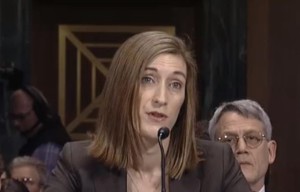
Privacy and Civil Liberties Board Member, The Honorable Rachel L. Brand, testifies before the Senate Judiciary Committee on Wednesday.
WASHINGTON — At a Wednesday Senate Judiciary Committee Hearing, members of the Privacy and Civil Liberties Oversight Board testified that the telephone records provision in Section 215 of the USA PATRIOT Act should no longer allow the bulk collection of telephone metadata by the federal government.
The hearing came five days after The Washington Post published a story asserting that the National Security Agency is “collecting less than 30 percent of all Americans’ call records,” which calls into question “the efficacy of [the] program.”
PCLOB Chairman David Medine refused to comment publicly on the validity of The Washington Post’s claims, but reaffirmed that the board would not change any of its recommendations because even if the findings of the Post story were true, “hundreds of millions of telephone records are being collected.”
Sen. Blumenthal, D-Conn., acting as committee chairman in the absence of Sen. Patrick Leahy, D-Vt., cited a secretive judicial ruling for the bulk telephone metadata collection program.
“In 2006, Judge (Malcolm) Howard [of the Federal Intelligence Surveillance Court] issued an extensive order allowing the government to collect phone records on potentially every American, without so much as issuing a written opinion,” Blumenthal said. The judge “chose not even to provide a sentence explaining his legal reasoning.”
Blumenthal said the absence of an explanation for the decision was “absolutely shocking,” given the law in 2006 that required the attorney general to pass along to Congress any major legal ruling from the FISA Court. However, there was a caveat to the law: the attorney general had to inform Congress of the legal basis of a FISA Court decision only if the court wrote an opinion.
In his opening statement, PCLOB Chairman David Medine restated the board’s position on the Section 215 bulk telephone records program outlined in its Jan. 23 report, saying “it lacks a viable legal foundation under Section 215, implicates constitutional concerns under the 1st and 4th Amendments, raises serious threats to privacy and civil liberties as a policy matter, and has shown only limited value.”
Section 215 of the USA PATRIOT Act has been heavily investigated and scrutinized following the revelations regarding the National Security Agency’s bulk telephone metadata collection brought about by the leaking of several top secret NSA documents by Edward Snowden in June of 2013.
Members of the PCLOB were not unanimous in the findings of their report. Two board members, Elisebeth Collins Cook and Rachel Brand, former Justice Department lawyers in the Bush administration, did not support the conclusion that the bulk telephony metadata collection program should be discontinued, holding that “the government’s interpretation of [Section 215] is a reasonable reading made in good faith by numerous officials in two administrations of different parties, and constitutes a good faith effort to subject a potentially controversial program to both judicial and legislative oversight.”
Brand also said that the program should be preserved because its value in its potential to stop terrorist plots outweighs the very few, if any, privacy threats it might pose. She pointed out that the program collects “only numbers,” not content of calls, its use is limited, as the government cannot examine the information in the database unless it has evidence that a particular phone number is connected to terrorist communications, and it is subject to “numerous layers of oversight.”
When asked by Iowa Sen. Charles Grassley, the top Republican on the committee, specifically why she did not agree with the board’s finding that the telephone metadata collection program is illegal, Brand cited a lack of differentiation between national security investigations and criminal investigations in the board’s examination of Section 215. For example, the PCLOB report said that “a grand jury subpoena has never been used to collect the volume of data that has been collected under the Section 215 program.” Brand argued that whether or not a grand jury subpoena is used to collect data in this context is not relevant as a disqualifier of legality because criminal investigations are “retrospective and comparatively narrow,” while FISA Court investigations are “long term, proactive, preventive intelligence investigation[s] into an entire terrorist organization.”
The board did unanimously agree that the federal government should immediately implement the following new privacy safeguards:
- Reduce the retention period for the bulk telephone records program from five years to three years;
- Reduce the number of “hops” used in contact chaining from three to two;
- Submit the NSA’s reasonable articulable suspicion determinations to the FISA court for review after they have been approved by the NSA and used to query the database;
- Require a reasonable articulable determination before analysts may submit queries to, or otherwise analyze, the corporate store database, which contains the contact chaining queries from the full collection store;
“The scope of surveillance authorities affecting Americans should be public, while the sensitive operational details regarding the conduct of government surveillance programs [should] remain classified” as a matter of national security, Medine said.
Sen. Blumenthal verbalized his disbelief that “eight years after this bulk metadata [collection] program was authorized, the courts had still not carefully worked through the issues that surround the program.”
Sen. Grassley also weighed in on the NSA program, saying he was concerned that “the Department of Justice hasn’t prosecuted any of the NSA employees who willfully abused their surveillance authority.” He cited the particular lack of an answer from Attorney General Eric Holder as to why this has not yet happened as the growing source of his discontent.
Asked if Congress should act to reform Section 215 or wait for the Supreme Court to rule on a case that would decide its legal viability, the board counseled that it is in the best interests of the country for Congress to “act sooner rather than later.”





